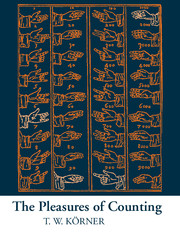Book contents
- Frontmatter
- Contents
- Preface
- I The uses of abstraction
- 1 Unfeeling statistics
- 2 Prelude to a battle
- 3 Blackett
- 4 Aircraft versus submarine
- II Meditations on measurement
- III The pleasures of computation
- IV Enigma variations
- V The pleasures of thought
- Appendix 1 Further reading
- Appendix 2 Some notations
- Appendix 3 Sources
- Bibliography
- Index
- Acknowledgements
1 - Unfeeling statistics
Published online by Cambridge University Press: 05 May 2014
- Frontmatter
- Contents
- Preface
- I The uses of abstraction
- 1 Unfeeling statistics
- 2 Prelude to a battle
- 3 Blackett
- 4 Aircraft versus submarine
- II Meditations on measurement
- III The pleasures of computation
- IV Enigma variations
- V The pleasures of thought
- Appendix 1 Further reading
- Appendix 2 Some notations
- Appendix 3 Sources
- Bibliography
- Index
- Acknowledgements
Summary
Snow on cholera
Mathematics is, at least in part, the science of abstraction. Mathematicians look at the rich complexity of the real world and replace it with a simple system which, at best, palely reflects one or two aspects of it. Roads become lines, towns become points, weather becomes a series of numbers (temperature, wind-speed, pressure, …) and human beings become units. The object of the first part of this book is to show how useful such abstraction can be.
In 1818 Europe became aware of a terrifying epidemic raging in parts of India. The disease, previously unknown to European science, struck suddenly, manifesting itself in violent diarrhoea and vomiting followed by agonising muscular cramps. An early description tells how
The eyes surrounded by a dark circle are completely sunk in the sockets, the skin is livid … the surface [of the skin] is now generally covered with cold sweat, the nails are blue, the skin of the hands and feet are corrugated as if they had been long steeped in water.
Often the skin turned blue or black and sometimes the convulsions were so severe that the body was contracted into a ball which could not be straightened out after death. The disease was named ‘Cholera Morbus’ and killed perhaps half its victims.
- Type
- Chapter
- Information
- The Pleasures of Counting , pp. 3 - 20Publisher: Cambridge University PressPrint publication year: 1996



